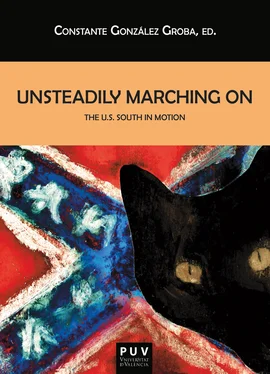1 ...6 7 8 10 11 12 ...21 In Faulkner’s view, “the river dominates not only the economy of that country but it dominates its spiritual life” (Gwynn & Blotner 178). However, the river gods in this time of flood are less than benevolent; rather, what they offer is a test of manhood; the Convict must learn “to accept anything the gods [throw] at him without even knowing that he [is] being tried” (Gwynn & Blotner 177). The testing takes the form of three violent dousings in the river, each a type of baptism into a life of ever stronger male resolve. The first immersion occurs early in the tall convict’s river experience, when the skiff capsizes, throwing him and his short companion into the water. The tall convict surfaces, still defiantly grasping the paddle which is held “perpendicular above them like a jackstaff, vanishing from the view of the short convict” (Faulkner, Wild Palms 103). In contrast to his lesser companion, the tall convict is flying the colours of his masculinity here, with the perpendicular paddle a suitable phallic symbol of male strength as it emerges Excalibur-like from the surface of the water. Shortly after this incident, he takes the pregnant woman on board, her swelling belly a suitably visible female reproach to his masculine paddle, no matter how he tries to ignore it. As the journey downriver continues, he feels that he has been “doomed from the very start never to get rid of her” (Faulkner, Wild Palms 120). The approaching second mammoth wave finds him in such fatalistic frame of mind:
So he hung there ... shaking the paddle and howling, when suddenly he remembered that other wave, the second wall of water full of houses and dead mules building up behind him back in the swamp. So he quit yelling then and went back to paddling. He was not trying to outrun it. He just knew from experience that when it overtook him, he would have to travel in the same direction it was moving in anyway, whether he wanted it or not, and when it did overtake him, he would begin to move too fast to stop, no matter what place he might come to where he could leave the woman, land her in time. (Faulkner, Wild Palms 121)
As in Huckleberry Finn , here too the river is fate, determining the flow and direction of the convict’s life. His second immersion combines a simultaneous physical birth and a spiritual rebirth, while the spirit of the great river manifests itself in the form of a swimming deer which leads the convict and the woman to safety before disappearing mystically. There are clear similarities here between “Old Man” and “The Bear”: indeed, the account of the convict’s encounter with the spirit of the river might be viewed as a trial run for Ike McCaslin’s later encounter with the spirit of the wilderness in “The Bear.” He hears the flood roar behind him as “the wave actually began to rear above his head into its thunderous climax” (Faulkner, Wild Palms 125), then sees the swimming deer and follows it even as both are swamped by the breaking wave:
he and the deer shot forward side by side at arm’s length, he watching the deer now, watching the deer begin to rise out of the water bodily until it was actually running along upon the surface, rising still, soaring clear of the water altogether, vanishing upwards in a dying crescendo of splashings and snapping branches, its damp scut flashing upwards, the entire animal vanishing upwards as smoke vanishes. (Faulkner, Wild Palms 126)
This climactic scene contains several important details. The river’s spirit – or the river gods, perhaps – saves him from drowning, but ironically so, since it also preserves and prolongs his fate of remaining with the woman – or, more accurately now, the mother, who gives birth just as she is thrown clear of the waters. The convict stumbles over a snake as he struggles to find his footing on dry land, a land now obviously and rather heavy-handedly cursed by the same old sins of men and women that will lead Ike, in imitation of his mentor Sam Fathers, to salute this embodiment of the evil principle, “Chief, Grandfather!” (Faulkner, Go Down, Moses 330).
The convict reveals in retrospect that the earlier part of his adventures took place on the Atchafalaya, a Louisiana river parallel to the Mississippi, but not the authentic river itself. However, once he reaches the “Old Man” his third and final test rewards the masculine determination he has shown throughout his travails. Even a humorous dialogue with his fellow prisoners, over the meaning of “haemophilic,” emphasises this point. They obviously mistake the word for “hermaphrodite” – “that’s a calf that’s a bull and a cow at the same time,” one observes sagely (Faulkner, Wild Palms 170) – which meets with the uncomplicated response, “Hell fire. He’s got to be one or the other to keep from drounding” (Faulkner, Wild Palms 170). So where is Judith Butler now, with her gradations of gender theory, in a context where such simply polarized differences apply?
Certainly, her notion of repetition holds good, with the convict acknowledging grimly that “there was a peculiar quality of repetitiveness about his present fate” ( Wild Palms 190). However, he evades immersion this third time, finding himself saved by a company of men, in that Faulknerian camaraderie so often found when even the most masculine of men must join together in fear of women. The river, Old Man, enables him to preserve his separate, womanless identity, symbolised by the jail clothing which he dons again. But he has not simply come full circle; he has responded to “a power, a force ... [a] cosmic violence” (Faulkner, Wild Palms 185) with which the river has tested his manhood:
When he saw the river again he knew it at once. He should have; it was now ineradicably a part of his past, his life; it would be a part of what he would bequeath, if that were in store for him. (Faulkner, Wild Palms 194)
Harry loses everything he wants, whereas the convict wins all he desires – thanks to a repeated assertion of his masculinity which not only uses muscle and nerve to survive the floods, but also involves the determination to keep his side of the bargain with the warders and deliver the woman to safety – safely away from him in his male world.
Faulkner employs a resurrection metaphor – “This man is dead,” is the official bureaucratic view of the obviously very much alive protagonist (Faulkner, Wild Palms 230) – and clarifies any ambiguity about the authenticity of the Atchafalaya and the Mississippi, the better to emphasise and preserve the mythic and mystical power of the “Old Man.” Richard Ford strives for a similar effect in A Piece of My Heart , where the island on which the climactic action occurs doesn’t exist on maps of the region at all. Although Ford may be taken to represent “postsouthern” writers, his first novel is decidedly more southern than post; in fact, it shares a number of similarities with the novels already mentioned: the various avenues of plot converge onto an island in the Mississippi where one of the protagonists hopes to renew his identity, much as Huck Finn does when he “lights out” for Jackson’s Island, another mystical, otherworldly place insofar as it shelters black and white runaways alike from a society which forbids them to exist together in any relationship beyond childhood.
There are further similarities with the structure of The Wild Palms , since Ford alternates sections which focus on each of his two protagonists separately, though he does not maintain a strict separation, as Faulkner does in his master-class in counterpoint, but finally weaves the stories of Robard Hewes and Sam Newel together. Newel is the character who travels south to the Mississippi in a voyage of self-renewal, as his name suggests. Traumatised by the gruesome accidental death of his father by decapitation, Newel is suffering a crisis about his own mortality which manifests itself in flashback memories of boyhood experiences with his father – italicised in the best Faulknerian manner – and also in the affectation of a limp, which is more psychological that physical in origin. Its function appears similar to Milkman’s affected lameness in Toni Morrison’s Song of Solomon (1977), which disappears as he grows into a mature and manly appreciation of his family and race heritage. Newel will discover a similar improvement after he is tested by the power of the Mississippi.
Читать дальше












